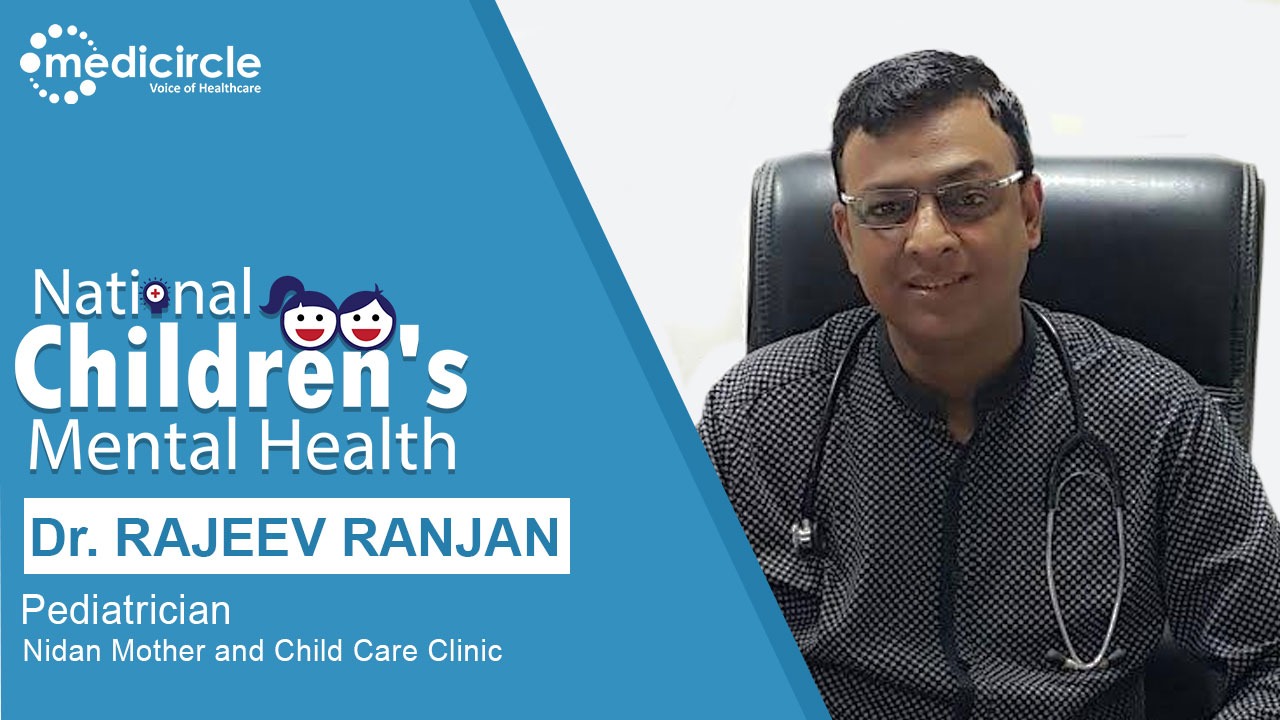According to the latest report by UNICEF, children and adolescents constitute 28% of the world's population. COVID-19 pandemic has led to short-term as well as long-term psychosocial and mental health implications in children and adolescents. Medicircle has geared towards providing measures for developing healthy coping mechanisms in children during the current crisis by speaking to mental health professionals in its exclusive series. The aim is to create understanding in adults about children's mental health and help them with constructive ideas so that they can shape innocent minds in the best possible way in this pandemic.
Dr. Rajeev Ranjan is one of the elite Neonatologist and Pediatricians in Delhi NCR. He has been working in the field of Pediatrics since 2000. He has multi-dimensional expertise in neonatal care and pediatric growth developments which enables kids to remain healthy. He has a glorious career with many professional achievements. He topped in the India RSBY project. He saved over 8000 newborns in NICU in his career. He has been part of prestigious courses and conferences in India and abroad. He's a member of the Indian Medical Association (IMA), Delhi Medical Council, and the Indian Academy of Pediatrics (IAP).
Impact of the pandemic on mental health
Talking about pandemic impact on mental health of children, Dr. Rajeev voices, “there are three groups, one is below 5 years, second is 5 -10 years and third is 10 – 18 years. The third group above 10 years, they can very well understand the situation, we can easily counsel them. We can educate them, we can make them aware of the pandemic. We can make them understand the new normal, pandemic protocol, rules that have to be followed. But for the first and second age group, it is difficult to make them understand what is happening around them. Babies who are just 2-3 years old have no social contact, can't go to the playground, don’t have any social connection. And this is creating a very negative impact on their mental health. Due to all this, they are developing delayed speech. Their milestones are delayed because they're not getting exposure. This period is leaving a very negative impact, especially on all small children.
Online classes – merits and demerits
Talking about online classes Dr. Rajeev expresses, “it is a forced compulsive decision by the school authorities and the government because the priority is to save children’s life. Also, the second wave of the corona is affecting kids, children in a big way. 20 to 40% of the population is the younger kids that are getting affected having mild to moderate symptoms. This is because of the mutant virus that is changing its genomic sequencing. It is giving new complications like black fungus, multi inflammatory syndromes (MIS). So, obese kids or kids with any comorbidity are facing major problems.
Dr. Rajeev adds, “Online classes are the only option left. First, we have to assure the safety of children. Because of online classes, screen time has increased drastically which is also not good for the mental development of the child. Children are getting only 20 - 25% positive outcomes from this online education so that neither class nor year is getting wasted. But you can't compensate for that. Overall their physical activity is zero, their exposure towards life is zero. They're not physically communicating or interacting. There is a huge difference between physical interaction and online interaction. But seeing the pandemic, it is the best option.”
This pandemic has taught us the real lessons of life. Life is like a roller coaster. We all have learned a lot in the past one and a half years. Talking about his experience in COVID times, Dr. Rajeev says, “I have taken full advantage of this pandemic. I have been making people aware, doing many live TV shows, webinars to increase awareness about the COVID. I have started doing online consultation too.”
Valuable tips for parents
Dr. Rajeev advises, “Parents can involve kids in a learning activity, they can make them feel that they're doing all the things which they used to do before the pandemic also. You can give extra time as most of us are working from home. You can make them learn the adversity of life, you can educate them, teach them so that they can be better prepared for a pandemic situation like this. This is not the end, we might get so many other adversities in our life. And that is life. Life without events is not life. We have to keep them in a positive frame of mind. We can listen to music, dance, can do physical activities, sports activities together. So this will have a positive impact.
Dr. Rajeev says, “In day-to-day life, we hardly get time for our kids. Till one year everyone is very caring towards their kids but after this, parents just give some electronic device to keep them engaged. Physical activity is zero. This is not only during a pandemic but otherwise also. Now we all live in a nuclear family. So, it's the responsibility of both parents to come up with new ideas to involve kids that make them feel that they are part of the family. Parents should involve kids in all phases, be it happiness or sorrow. You can give some task like it’s your job to see that everybody's wearing masks, following the hand sanitization rules. You can teach them to be a better version.
(Edited by Renu Gupta)

 The pandemic has affected very badly on the mental health of small children. Online classes have their own merits and demerits. It's the responsibility of both the parents to keep their child in a positive frame of mind – Dr. Rajeev Ranjan, Pediatrician
The pandemic has affected very badly on the mental health of small children. Online classes have their own merits and demerits. It's the responsibility of both the parents to keep their child in a positive frame of mind – Dr. Rajeev Ranjan, Pediatrician


































